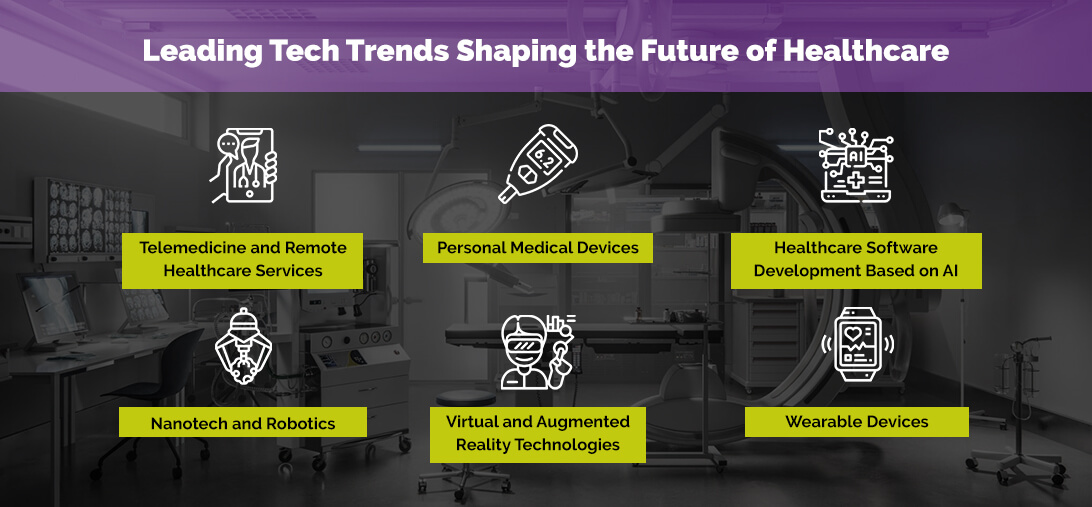
Healthcare Software: Revolutionising the future of healthcare technology in software development
25 October 2023
The healthcare industry is witnessing rapid transformation with technology. In particular, it is the custom software development that is transforming the way healthcare is approached. With the need for personalised care solutions demanded by patients and an increased need for improved efficiency, custom healthcare software development has emerged as a game-changer.
Tech solutions like AI-powered diagnostics and robotic surgery are shaping the future of healthcare. Companies are racing to develop such innovative and effective healthcare software development tools that will bring this advancement to fruition.
As the healthcare industry continues to evolve, the possibilities are endless, and custom software development is expected to play a significant role in shaping its future. Bespoke development empowers healthcare professionals to provide more efficient and effective treatment plans and enhanced patient engagement.
In this blog post, we will explore the transformative impact of custom healthcare solutions and the role it will play in revolutionizing the future of technology in healthcare software development.
Key Statistics on Healthcare Software Development
- Grand View Research states that the global healthcare ERP market is expected to experience a Compound Annual Growth Rate (CAGR) of 6.6% between the years 2021 to 2028.
- McKinsey highlights the potential for technology-driven innovation to improve patient understanding, enable customised care, and yield an anticipated annual value ranging from £350 billion to £410 billion by 2025.
Reasons to Invest in Custom Software Solutions in 2024
There are numerous benefits for the healthcare industry to invest in custom software development:
- Better Patient Outcomes: Healthcare providers can drive better patient care and outcomes and improve healthcare services by leveraging technology.
- Enhanced Efficiency: Custom healthcare software development enable organisations to operate more efficiently. It is done by streamlining processes, automating administrative tasks, and reducing errors.
- Advanced Financial Performance: Drive positive financial outcomes for your organisation by improving care delivery and reducing costs with the help of healthcare software development solutions.
- Improved Access to Care: Patient care can now be receive from the comfort of their homes with the help of telehealth platforms and other remote healthcare services. This has not only reduced the burden on healthcare providers but also increased the access to care.
- Better Data Management: Customised software development solutions enable healthcare providers to manage, analyse, and share data more effectively. It provides a centralised warehouse for patient data and medical records.
- Competitive Advantage: Investing in health tech, particularly if bespoke rather than off the shelf solutions, is a smart move as it can distinguish you from competitors.
Categorising Custom Healthcare Software
Healthcare software can be categorised into two primary groups: business-centric and patient-centric. We will explore both options in detail.
Business-centric Healthcare Solutions
Designed to improve the efficiency of healthcare providers, popular solutions in this classification include:
- Hospital Management Software: This software solution effectively aims to streamline operations or the general running of hospitals. Its comprehensive functions include managing patients, handling billing, and overseeing inventory control.
- Electronic Health Records (EHR) Software: EHR software is designed to offer a secure and centralised storage space for all patient records. With this tool, healthcare providers can access critical patient data anytime and from any location.
- Medical Imaging Software: With this software, doctors and technicians can store, manage, and analyse medical images, including X-rays, CT scans, and MRIs. This technology serves as a valuable tool for medical professionals.
- Medical Diagnosis Software: This software offers healthcare providers with an extensive database consisting of medical knowledge, guidelines, and algorithms, thereby enabling accurate diagnoses.
- Medical Billing Software: This software streamlines the medical billing process and minimises errors, making it highly efficient.
- Revenue Cycle Management (RCM) Software: This innovative solution assists healthcare providers in enhancing their financial performance by simplifying billing and collections procedures.
Patient-centric Healthcare Solutions
Designed to empower patients and focus on enhancing their overall healthcare experience, popular solutions in this category are:
- Telemedicine Software: This software facilitates remote medical care for patients using technologies such as video conferencing.
- Patient Information Portal: Patients can access their health information. This portal securely contains important patient data, such as test results and medication lists.
- Personal Health Record (PHR) Software: This software allows users to store, track, and manage their patient data. It gives patients control over their healthcare journey.
- E-Prescribing Software: E-prescribing software empowers healthcare organizations to dispatch prescription details directly to a patient’s pharmacy, reducing inaccuracies and increasing efficiency.
Leading Tech Trends Shaping the Future of Healthcare
With technological advancements and the growing need for accessible care, the healthcare software development industry is rapidly transforming. Tech trends that can shape the future of the healthcare sector include,

- Telemedicine and Remote Healthcare Services: These services have made it possible for patients to receive medical care via remote consultations rather than physical visits, leading to a reduction in in-person appointments and a greater reach of healthcare services.
- Personal Medical Devices: Wearable monitors, blood glucose meters, and heart rate monitors and healthcare apps offer patients convenient options to keep track of and regulate their health.
- Healthcare Software Development Based on AI: By leveraging artificial intelligence, healthcare professionals can make more accurate diagnoses, minimise medical errors, and streamline their workflows to increase efficiency.
- Virtual and Augmented Reality Technologies: Innovative technological advancements in virtual and augmented reality have facilitated medical professionals to receive training, enhance patient education, and potentially provide treatments for different medical conditions.
- Nanotech and Robotics: This has facilitated the development of innovative medical devices, treatments, and diagnostic tools. It has enabled healthcare organizations to confront the most challenging health issues with effectiveness.
- Wearable Devices: The trend of using a wearable device like a smartwatch and fitness tracker amongst patients is on the rise, providing a convenient way for them to keep tabs on their health and maintain their overall well-being.
How chilliapple can Help you with Custom Healthcare Software Development
The healthcare industry has revolutionised with the help of digital transformation and tailored solutions, and the future of medical software development appears bright. When choosing the right one, it’s crucial to evaluate the needs of medical institutions and the scalability of a healthcare software solution. With a thoughtful approach and the right technology partner, custom healthcare software development has the potential to make a difference in the healthcare market.
chilliapple, a software consultancy with a highly skilled development team and a track record of successful healthcare software development projects, can assist in building custom healthcare systems for any organisation. Trust chilliapple to create successful healthcare software that improves patient outcomes and patient engagement. Get in touch with our software developers today.





